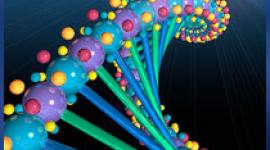How Casual Drug Use Leads to Addiction
No one ever starts out using drugs intending to become a drug addict. Overtime, use of addictive drugs changes the brain and leads to compulsive drug use.
It is an all-too-common scenario: A person experiments with an addictive drug like cocaine. Perhaps he intends to try it just once, for "the experience" of it. It turns out, though, that he enjoys the drug's euphoric effect so much that in ensuing weeks and months he uses it again -- and again. But in due time, he decides he really should quit. He knows that despite the incomparable short-term high he gets from using cocaine, the long-term consequences of its use are perilous. So he vows to stop using it.
His brain, however, has a different agenda. It now demands cocaine. While his rational mind knows full well that he shouldn't use it again, his brain overrides such warnings. Unbeknown to him, repeated use of cocaine has brought about dramatic changes in both the structure and function of his brain. In fact, if he'd known the danger signs for which to be on the lookout, he would have realized that the euphoric effect derived from cocaine use is itself a sure sign that the drug is inducing a change in the brain -- just as he would have known that as time passes, and the drug is used with increasing regularity, this change becomes more pronounced, and indelible, until finally his brain has become addicted to the drug.
And so, despite his heartfelt vow never again to use cocaine, he continues using it. Again and again.
His drug use is now beyond his control. It is compulsive. He is addicted.
While this turn of events is a shock to the drug user, it is no surprise at all to researchers who study the effects of addictive drugs. To them, it is a predictable outcome.
To be sure, no one ever starts out using drugs intending to become a drug addict. All drug users are just trying it, once or a few times. Every drug user starts out as an occasional user, and that initial use is a voluntary and controllable decision. But as time passes and drug use continues, a person goes from being a voluntary to a compulsive drug user. This change occurs because over time, use of addictive drugs changes the brain -- at times in big dramatic toxic ways, at others in more subtle ways, but always in destructive ways that can result in compulsive and even uncontrollable drug use.
How the Brain Reacts to Drug Abuse
 The fact is, drug addiction is a brain disease. While every type of drug of abuse has its own individual "trigger" for affecting or transforming the brain, many of the results of the transformation are strikingly similar regardless of the addictive drug that is used -- and of course in each instance the result is compulsive use. The brain changes range from fundamental and long-lasting changes in the biochemical makeup of the brain, to mood changes, to changes in memory processes and motor skills. And these changes have a tremendous impact on all aspects of a person's behavior. In fact, in addiction the drug becomes the single most powerful motivator in the life of the drug user. He will do virtually anything for the drug.
The fact is, drug addiction is a brain disease. While every type of drug of abuse has its own individual "trigger" for affecting or transforming the brain, many of the results of the transformation are strikingly similar regardless of the addictive drug that is used -- and of course in each instance the result is compulsive use. The brain changes range from fundamental and long-lasting changes in the biochemical makeup of the brain, to mood changes, to changes in memory processes and motor skills. And these changes have a tremendous impact on all aspects of a person's behavior. In fact, in addiction the drug becomes the single most powerful motivator in the life of the drug user. He will do virtually anything for the drug.
This unexpected consequence of drug use is what I have come to call the oops phenomenon. Why oops? Because the harmful outcome is in no way intentional. Just as no one starts out to have lung cancer when they smoke, or no one starts out to have clogged arteries when they eat fried foods which in turn usually cause heart attacks, no one starts out to become a drug addict when they use drugs. But in each case, though no one meant to behave in a way that would lead to tragic health consequences, that is what happened just the same, because of the inexorable, and undetected, destructive biochemical processes at work.
While we haven't yet pinpointed precisely all the triggers for the changes in the brain's structure and function that culminate in the "oops" phenomenon, a vast body of hard evidence shows that it is virtually inevitable that prolonged drug use will lead to addiction. From this we can soundly conclude that drug addiction is indeed a brain disease.
I realize that this flies in the face of the notion that drug addiction boils down to a serious character flaw -- that those addicted to drugs are just too weak-willed to quit drug use on their own. But the moral weakness notion itself flies in the face of all scientific evidence, and so it should be discarded.
It should be stressed, however, that to assert that drug addiction is a brain disease is by no means the same thing as saying that those addicted to drugs are not accountable for their actions, or that they are just unwitting, hapless victims of the harmful effects that use of addictive drugs has on their brains, and in every facet of their lives.
Just as their behavior at the outset was pivotal in putting them on a collision course with compulsive drug use, their behavior after becoming addicted is just as critical if they are to be effectively treated and to recover.
At minimum, they have to adhere to their drug treatment regimen. But this can pose an enormous challenge. The changes in their brain that turned them into compulsive users make it a daunting enough task to control their actions and complete treatment. Making it even more difficult is the fact that their craving becomes more heightened and irresistible whenever they are exposed to any situation that triggers a memory of the euphoric experience of drug use. Little wonder, then, that most compulsive drug users can't quit on their own, even if they want to (for instance, at most only 7 percent of those who try in any one year to quit smoking cigarettes on their own actually succeed). This is why it is essential that they enter a drug treatment program, even if they don't want to at the outset.
Understanding Drug Addiction
Clearly, a host of biological and behavioral factors conspires to trigger the oops phenomenon in drug addiction. So the widely held sentiment that drug addiction has to be explained from either the standpoint of biology or the standpoint of behavior, and never the twain shall meet, is terribly flawed. Biological and behavioral explanations of drug abuse must be given equal weight and integrated with each other if we are to gain an in-depth understanding of the root causes of drug addiction and then develop more effective treatments. Modern science has shown us that we reduce one explanation to the other -- the behavioral to the biological, or vice versa - at our own peril. We have to recognize that brain disease stemming from drug use cannot and should not be artificially isolated from its behavioral components, as well as its larger social components. They all are critical pieces of the puzzle that interact with and impact on one another at every turn.
A wealth of scientific evidence, by the way, makes it clear that rarely if ever are any forms of brain disease only biological in nature. To the contrary, such brain diseases as stroke, Alzheimer's, Parkinson's, schizophrenia, and clinical depression all have their behavioral and social dimensions. What is unique about the type of brain disease that results from drug abuse is that it starts out as voluntary behavior. But once continued use of an addictive drug brings about structural and functional changes in the brain that cause compulsive use, the disease-ravaged brain of a drug user closely resembles that of people with other kinds of brain diseases.
It's also important to bear in mind that we now see addiction as a chronic, virtually life-long illness for many people. And relapse is a common phenomenon in all forms of chronic illness -- from asthma and diabetes, to hypertension and addiction. The goals of successive treatments, as with other chronic illnesses, are to manage the illness and increase the intervals between relapses, until there are no more.
About the author: Dr. Leshner is Director, National Institute of Drug Abuse, National Institutes of Health
next: What is Drug Testing and How Does It Work?
~ addictions library articles
~ all addictions articles
APA Reference
Staff, H.
(2008, December 19). How Casual Drug Use Leads to Addiction, HealthyPlace. Retrieved
on 2026, March 4 from https://www.healthyplace.com/addictions/articles/how-casual-drug-use-leads-to-addiction



